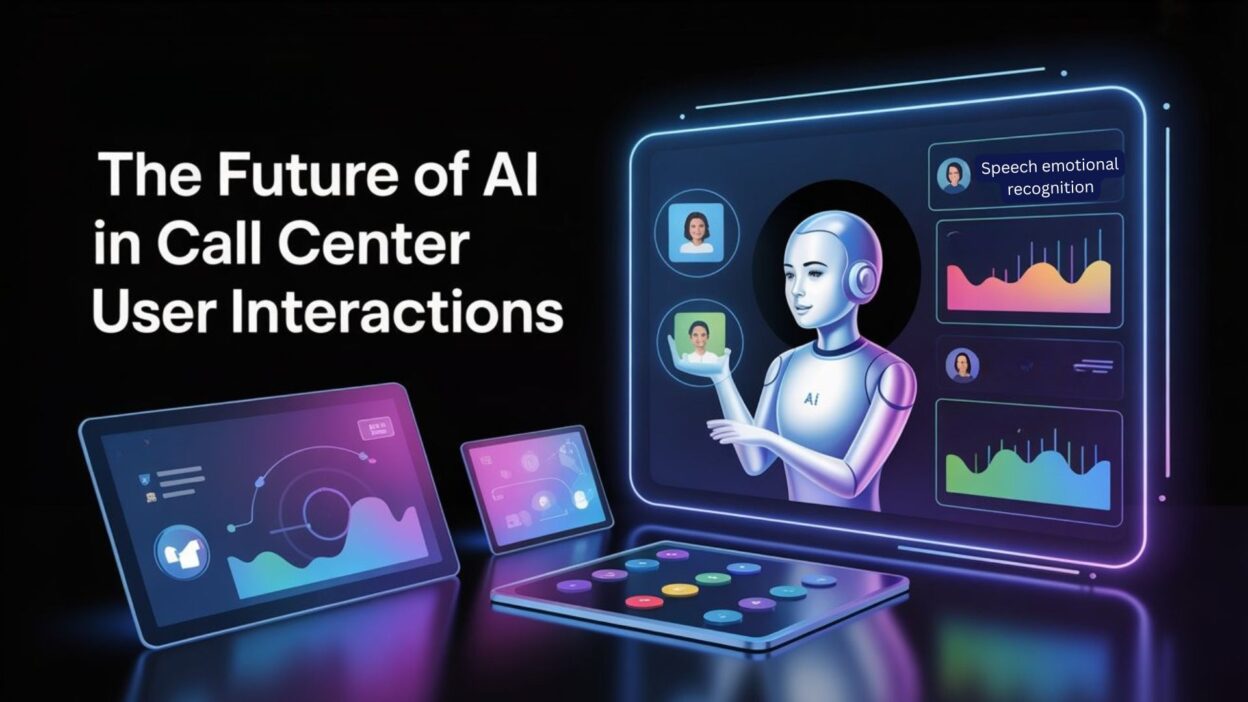TL;DR Customer service has changed dramatically over the past decade. Call centers are no longer just phone-based operations with long wait times. The future of AI in call center user interactions promises something entirely different. AI technology reshapes how businesses connect with customers. Companies are investing billions in artificial intelligence solutions. These investments aim to create seamless customer experiences.
Table of Contents
The traditional call center model is becoming obsolete. AI-powered systems offer instant responses and personalized support. Customers demand faster solutions to their problems. Businesses must adapt or risk losing their competitive edge. The transformation is happening now, not in some distant future.
Understanding AI Technology in Modern Call Centers
Artificial intelligence has moved beyond science fiction. Real businesses deploy AI systems every single day. Natural language processing allows computers to understand human speech. Machine learning helps systems improve without human programming. These technologies work together to create intelligent customer service. The future of AI in call center user interactions depends on these core technologies.
Companies can now automate routine inquiries completely. Complex problems still require human intervention. The balance between automation and human touch remains crucial. Customers appreciate quick answers to simple questions. They also value empathy during difficult situations. AI systems continue learning from every interaction.
Natural Language Processing Capabilities
Natural language processing has advanced remarkably in recent years. Computers can now understand context and intent. They recognize emotions in customer voices. They adapt responses based on conversation flow. This technology powers most modern AI assistants. Customers speak naturally without learning specific commands.
The system interprets meaning rather than just keywords. Misunderstandings happen less frequently than before. The future of AI in call center user interactions relies heavily on NLP improvements. Dialects and accents no longer pose major challenges. Multi-language support happens automatically in many systems. Real-time translation breaks down language barriers completely.
Machine Learning and Predictive Analytics
Machine learning algorithms improve customer service constantly. Systems analyze millions of past interactions. They identify patterns humans might miss entirely. Predictive analytics forecasts customer needs before problems arise. Companies can proactively reach out to customers. This approach prevents issues rather than just solving them.
The future of AI in call center user interactions includes predictive capabilities. Customers receive personalized recommendations based on their history. Systems anticipate questions during specific times of the year. Seasonal trends inform automated responses appropriately. Learning never stops for these intelligent systems.
Current AI Applications Transforming Customer Service
Many companies already use AI in their operations. Chatbots handle initial customer inquiries on websites. Voice assistants guide callers through automated menus. Virtual agents resolve common problems without human help. These applications represent just the beginning. The future of AI in call center user interactions will expand far beyond current capabilities.
Banks use AI to detect fraudulent activities instantly. Retail companies employ AI for product recommendations. Healthcare providers schedule appointments through automated systems. Each industry adapts AI to its specific needs. The technology proves versatile across different sectors. Implementation costs continue decreasing over time.
Intelligent Virtual Assistants
Virtual assistants have become incredibly sophisticated. They handle multiple conversations simultaneously without confusion. Customers receive immediate attention regardless of call volume. Wait times disappear for routine inquiries completely. These assistants access customer data in real-time. They provide personalized responses based on account history.
The future of AI in call center user interactions will make virtual assistants indistinguishable from humans. Voice synthesis technology sounds completely natural now. Customers often cannot tell they are speaking with AI. This seamless experience improves satisfaction dramatically. Virtual assistants work around the clock without breaks. Consistency in service quality remains constant.
Sentiment Analysis and Emotion Detection
AI systems now detect customer emotions during conversations. Sentiment analysis measures frustration levels accurately. Systems recognize when customers need human assistance. They escalate calls automatically when emotions run high. This capability prevents small problems from becoming major complaints. The future of AI in call center user interactions prioritizes emotional intelligence.
Happy customers receive different responses than angry ones. AI adjusts its tone based on customer mood. Empathy becomes part of automated interactions now. Companies track satisfaction in real-time during calls. Managers intervene immediately when sentiment turns negative. This proactive approach saves customer relationships regularly.
Benefits of Driving AI Adoption in Call Centers
Cost reduction remains the primary driver for AI adoption. Companies save millions on staffing expenses annually. One AI system replaces dozens of human agents. Operating costs drop significantly after the initial investment. Customer satisfaction improves despite reduced staffing levels.
The future of AI in call center user interactions offers multiple advantages beyond cost. Response times shrink from minutes to seconds. Customers get help instantly regardless of volume. Accuracy improves because AI systems never get tired. They access information faster than any human could. Consistency in responses builds customer trust over time. Data collection happens automatically during every interaction.
Operational Efficiency and Scalability
AI systems scale instantly to meet demand. Holiday seasons no longer require temporary staff hiring. Systems handle thousands of simultaneous conversations easily. Companies adjust capacity without recruitment delays. Training costs disappear for routine inquiries completely.
The future of AI in call center user interactions eliminates traditional scaling challenges. Businesses expand into new markets without staffing concerns. Language support is added with simple software updates. Peak times no longer create bottlenecks in service. Customer experience remains excellent during high-volume periods. Operational flexibility becomes a competitive advantage. Companies respond to market changes much faster.
Enhanced Customer Experience and Satisfaction
Customers benefit tremendously from AI implementations. They receive help at any time of day. No more waiting on hold for simple questions. Problems are resolved faster than ever before. Personalization creates memorable customer experiences. The future of AI in call center user interactions puts customers first. Systems remember previous conversations and preferences.
Customers avoid repeating information multiple times. Recommendations become more relevant over time. Self-service options empower customers to solve problems independently. Satisfaction scores climb when AI deploys properly. Customer loyalty increases with better service quality.
Challenges Facing AI Implementation
Implementing AI systems presents significant challenges. Integration with existing systems causes technical difficulties. Legacy infrastructure may not support modern AI. Data privacy concerns require careful attention. Customers worry about information security constantly. The future of AI in call center user interactions must address these concerns.
Some customers prefer human interaction always. They distrust automated systems for complex problems. Cultural differences affect AI acceptance rates. Developing countries lag in AI adoption. Technical failures can damage customer relationships severely. Companies must prepare backup systems carefully.
Data Security and Privacy Concerns
Customer data represents a valuable asset. It also creates serious liability risks. Data breaches damage company reputations permanently. Regulations like GDPR impose strict requirements. AI systems collect vast amounts of personal information. The future of AI in call center user interactions demands robust security. Companies must encrypt all customer communications.
Access controls prevent unauthorized data viewing. Compliance teams work constantly to meet regulations. Customers need assurance that their information stays protected. Transparency about data usage builds necessary trust. Security investments cannot be optional anymore.
Maintaining Human Connection
AI cannot replicate human empathy perfectly yet. Some situations require genuine human understanding. Customers dealing with loss need compassionate responses. Automated systems may seem cold during emotional situations. The future of AI in call center user interactions balances automation with humanity.
Companies must decide which interactions need humans. Complex problems often require creative solutions. AI follows rules but cannot think creatively. The human element remains irreplaceable in many scenarios. Hybrid models combining AI and humans work best. Customers appreciate having both options available.
Emerging Trends Shaping the Future
Voice technology continues advancing at an incredible speed. Conversational AI becomes more natural daily. Customers will soon forget they are speaking with machines. Visual AI will analyze customer facial expressions. Video calls will provide richer interaction data. The future of AI in call center user interactions includes multimodal communication.
Augmented reality might guide customers through troubleshooting steps. Virtual reality could create immersive customer service experiences. Blockchain technology may secure customer data better. Quantum computing could process interactions instantaneously. These technologies will converge in the coming years.
Hyper-Personalization Through AI
AI systems will know customers incredibly well. They will predict needs before customers ask. Recommendations will feel almost psychic in accuracy. Shopping history informs every single interaction. Browsing behavior creates detailed customer profiles. The future of AI in call center user interactions means true personalization.
Marketing messages will match individual preferences perfectly. Product suggestions will align with personal values. Pricing might even adjust to individual circumstances. Privacy concerns will intensify with hyper-personalization. Companies must balance personalization with respect. Customers want relevant service without feeling surveilled.
Omnichannel Integration and Seamless Experience
Customers switch between channels constantly during interactions. They start on websites and finish on phones. They expect continuity across all touchpoints. AI must track conversations across multiple platforms. The future of AI in call center user interactions requires seamless integration.
Social media messages connect with phone conversations. Email inquiries link to chat transcripts automatically. Customers never repeat themselves regardless of channel. This integration demands sophisticated technical infrastructure. Companies invest heavily in unified customer platforms. The payoff comes in superior customer experiences.
Industry-Specific AI Applications
Healthcare uses AI for appointment scheduling efficiently. Medical AI answers basic health questions safely. Financial services deploy AI for fraud detection. Banking chatbots handle account inquiries instantly. Retail AI provides product recommendations constantly. E-commerce companies use AI for order tracking. Telecommunications firms automate billing inquiries completely.
Travel industry AI assists with booking changes. Each sector adapts AI to unique requirements. The future of AI in call center user interactions varies by industry. Insurance companies process claims through AI systems. Real estate AI schedules property viewings automatically. Educational institutions use AI for student support.
Preparing Your Call Center for AI Integration
Companies must assess their current infrastructure carefully. They need clear objectives for AI implementation. Employee training becomes absolutely critical for success. Staff must learn to work alongside AI. Change management prevents resistance to new technology. The future of AI in call center user interactions requires strategic planning.
Companies should start small with pilot programs. They can expand gradually after proving success. Budget allocation must include ongoing maintenance costs. Technical support teams need proper training too. Customer communication about AI deployment builds trust. Transparency about automation helps manage expectations.
The Human-AI Collaboration Model
The best approach combines human and AI strengths. AI handles repetitive tasks with perfect consistency. Humans manage complex situations requiring judgment. This partnership maximizes both efficiency and quality. Agents focus on high-value customer interactions. AI supports them with instant information access. The collaboration model represents the practical future.
Employees become AI supervisors rather than replacements. They handle escalations from automated systems. They provide training data for AI improvement. Job roles evolve rather than disappear completely. This partnership creates better outcomes for everyone.
Measuring Success and ROI
Companies must track specific metrics carefully. First response time shows AI efficiency clearly. Resolution rates indicate problem-solving effectiveness. Customer satisfaction scores reveal experience quality. Cost per interaction demonstrates financial benefits. The future of AI in call center user interactions depends on measurable results. Employee satisfaction matters as much as customer metrics.
Technology adoption rates show internal acceptance. Return on investment calculations justify continued spending. Companies need baseline measurements before AI deployment. Regular reporting keeps stakeholders informed constantly. Success metrics should align with business objectives.
Ethical Considerations and Responsible AI
AI systems must operate transparently always. Customers deserve to know when speaking with machines. Bias in AI algorithms creates serious concerns. Training data must represent diverse populations fairly. Decisions affecting customers need human oversight.
Companies bear responsibility for AI actions completely. The future of AI in call center user interactions must prioritize ethics. Fairness in treatment matters regardless of demographics. AI should enhance rather than replace human judgment. Companies must audit their AI systems regularly. Ethical frameworks guide responsible AI development. Customer welfare should override efficiency goals sometimes.
Frequently Asked Questions
How does AI improve call center efficiency?
AI handles routine inquiries automatically without human intervention. Systems work continuously without breaks or fatigue. They process multiple conversations simultaneously without errors. Response times decrease from minutes to mere seconds. Staffing costs reduce significantly over time. Companies redirect human agents to complex problems. The future of AI in call center user interactions maximizes resource utilization.
Will AI replace human call center agents completely?
AI will not replace humans entirely anytime soon. Complex problems still require human creativity. Emotional situations demand genuine human empathy. AI handles routine tasks while humans focus on exceptions. The hybrid model combines both strengths effectively. Job roles will evolve rather than disappear. Humans supervise and improve AI systems continuously.
What technologies power AI call centers?
Natural language processing enables conversation understanding. Machine learning allows systems to improve automatically. Speech recognition converts voice to text accurately. Sentiment analysis detects customer emotions in real-time. Predictive analytics forecast customer needs proactively. Cloud computing provides the necessary processing power. These technologies work together to create intelligent systems.
How do customers benefit from AI in call centers?
Customers receive instant responses regardless of time. Wait times disappear for common inquiries completely. Personalized service improves through data analysis. Self-service options empower customers to solve problems. Consistency in service quality remains high. Multiple language support breaks communication barriers. Overall satisfaction increases with faster resolutions.
What challenges do companies face in implementing AI?
Integration with legacy systems creates technical difficulties. Data privacy regulations require strict compliance. Initial investment costs can seem prohibitively high. Employee resistance to change slows adoption. Customer acceptance varies across demographics. System failures can damage customer relationships. Security vulnerabilities demand constant attention and updates.
Read More: How Quickly Can Enterprises Deploy AI Voice Technology?
Conclusion

The future of AI in call center user interactions has already begun. Technology continues to advance at an unprecedented pace. Companies investing in AI gain significant competitive advantages. Customer expectations evolve constantly toward instant service. AI delivers speed and efficiency that humans cannot match.
The technology will become more sophisticated every year. Natural conversations with AI will feel completely normal. Personalization will reach levels previously thought impossible. Human agents will focus on complex and emotional interactions.
The transformation requires careful planning and execution. Companies must balance automation with human connection. Ethical considerations should guide every implementation decision.
Customer trust remains paramount throughout this journey. Data security cannot be compromised under any circumstances. The hybrid model combining AI and humans works best. Employees need training to work alongside intelligent systems. Continuous improvement should be the operating philosophy.
Success requires measuring results against clear objectives. Customer satisfaction should improve, not just costs decrease. The technology serves people, not replaces them entirely. Companies ready to embrace change will thrive. Those resisting this transformation will fall behind competitors.
The future belongs to organizations prioritizing customer experience. AI makes exceptional service scalable and affordable. Every business should evaluate its AI readiness now. The question is not whether to adopt AI. The question is how quickly you can implement it effectively.






[…] Read More: The Future of AI in Call Center User Interactions […]